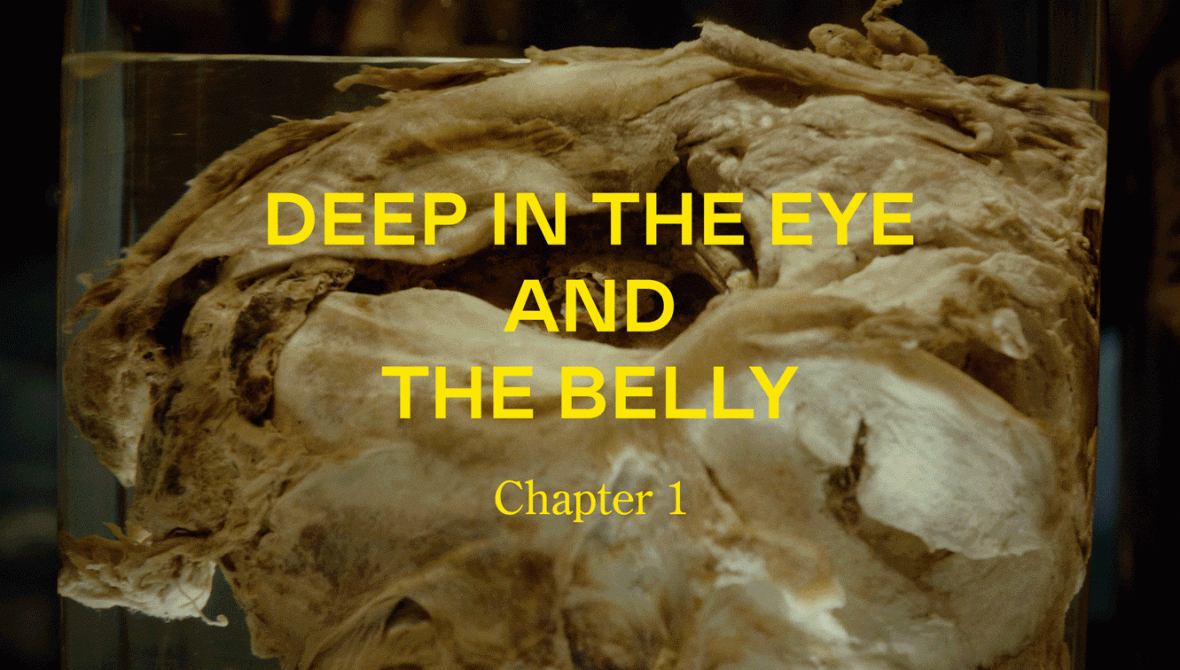Deep in The Eye and The Belly (screening)
Wed 18 October 2023, 6pm - 8pm at Stanley Evernden Studio, Martin Hall, Loughborough University, LE11 3TU

(Photo credit: Sam Williams)
Please join us on Wednesday 18th October for an evening screening of Sam Williams’ Deep in The Eye and The Belly (Chapter 1), followed by a panel discussion with the artist alongside Art Historian Dr Pandora Syperek, and Principal Curator of Mammals at the Natural History Museum, Richard Sabin.
We will also be hosting a looped screening of Chapters 1-5 from 10-5pm on both 18th and 19th October, and invite you to drop in on either day.
Please RSVP for the Wednesday screening evening here
About the film
In the present day, a story is unearthed of a whale body that became a world of dinner parties, clandestine sex and mayoral speeches. In a possible future, a group of those-who-were-left-behind (or, those-who-chose-to-stay) have made a home inside the body of a whale. They find themselves contemplating this new world and speculating on the state of things outside – a world ravaged by a climate crisis which they survived by turning to the ocean. At a crossing between the present day and this potential future, a lone figure sings a lament for the body of the world’s last whale.
Deep in The Eye and The Belly is an ongoing body of work entwining stories of cetacean bodies with imagined oceanic futures in which these bodies become shelter for humans who returned to the oceans in the wake of climate collapse. Through a series of five chapters that blend documentary, song, improvisation and theatrical monologues, the films meditate and ask questions on the entangled nature of human and non-human relations, the notion of community, bodily transformation and the possibilities of an oceanic future.
About the panel
Sam Williams is an artist with a multi-or non-disciplinary practice, working across moving-image, collage, choreography and text. Sam lives and works in London, where he is a studio resident at Somerset House Studios. Sam has exhibited, performed and screened work at institutions including Chisenhale Gallery, Arnolfini, Baltic39, Siobhan Davies Dance, Somerset House, Tate Britain, Studio Voltaire and South Kiosk (UK), She Will (Norway); Kino Arsenal, Akademie der Kunst, Tanzhalle Wisenberg, Oberhausen Film Festival and B3 Biennale (Germany). Sam has been artist in residence at Rupert, Lithuania (2022), PRAKSIS, Oslo (2018) and in 2021 was selected as one of ten artists forming the Wysing Arts Centre Syllabus, a peer-led alternative education program. From 2010 until her death in 2016 he worked closely with the British choreographer Rosemary Butcher and now works towards the preservation of her legacy and archive.
Sam's ongoing research focuses on multispecies entanglements, ecological systems, bodies-as-worlds and folk mythologies and how they can inspire ideas for present and future ways of non-human-centric living.
Find out more about Sam Williams
Dr Pandora Syperek researches the intersections of art and science, gender and the nonhuman within cultures of display. She is currently Leverhulme Early Career Fellow at Loughborough University London and Visiting Fellow at the V&A Research Institute. Publications include Oceans: Documents of Contemporary Art (Whitechapel Gallery/MIT Press, 2023) and the Journal of Curatorial Studies special issue ‘Curating the Sea’ (2020), both co-edited with Sarah Wade, as well as book chapters and journal articles on ‘Hope’ the Natural History Museum’s blue whale skeleton, Victorian insect culture and the Blaschka glass models of marine invertebrates. An entry on ‘Animal Studies’ for the Johns Hopkins Guide to Cultural and Critical Theory is forthcoming. Pandora is co-investigator on the Paul Mellon Centre-funded research project ‘Exhibiting Oceans in the UK Today’ and co-lead on Loughborough’s Institute of Advanced Studies’ 2023-24 annual theme ‘Gestation: Bodies, Technologies, Ecologies, Justice’. She has taught on modern and contemporary art, design and curatorial studies at Loughborough University, Sotheby’s Institute of Art, University College London and York University. She holds a PhD in the History of Art from UCL.
Richard Sabin is Principal Curator of Mammals at the Natural History Museum (NHM), London, where he has worked for more than 30 years. With his curatorial work primarily focused on the study of cetaceans using the Natural History Museum’s world-class research collections, Richard is collaborating with colleagues from around the world to generate new scientific data from old Museum specimens. He is currently exploring historical contaminants and stress levels in baleen whales using wax earplugs and sperm whale population structure using teeth. He supports wildlife conservation, UK and international law enforcement through his endangered species identification work and is NHM advisor to the UK Cetacean Strandings Investigation Programme.
Richard was scientific lead for the redisplay of ‘Hope’, the NHM’s iconic blue whale specimen, spending time in the Pacific to study blue whale feeding behaviour and translating his observations into the dramatic lunge-feeding pose Hope’s skeleton now displays in the NHM’s Hintze Hall. He was also scientific lead for the NHM temporary exhibition ‘Whales: Beneath the Surface’ (2017-18), which explored the origins, adaptations, behaviour and culture of cetaceans. He has published scientific papers in a wide variety of key journals and has written books and chapters in edited works for non-specialist audiences. He works closely with the arts and humanities to help develop new perspectives and explore ‘hidden’ histories of collections and is dedicated to expanding and diversifying museum audiences. He is committed to public engagement, public speaking and has worked extensively with broadcast media organisations.
Accessibility
The studio is located on the ground floor and there is step-free access into the building. There is an accessible toilet close by on the ground floor corridor.
For more information about the venue, including photographs, view the access guide for Martin Hall on AccessAble.
If you have any specific access requirements then please contact LUArts@lboro.ac.uk in advance of booking or visiting and we will do our best to accommodate them.

